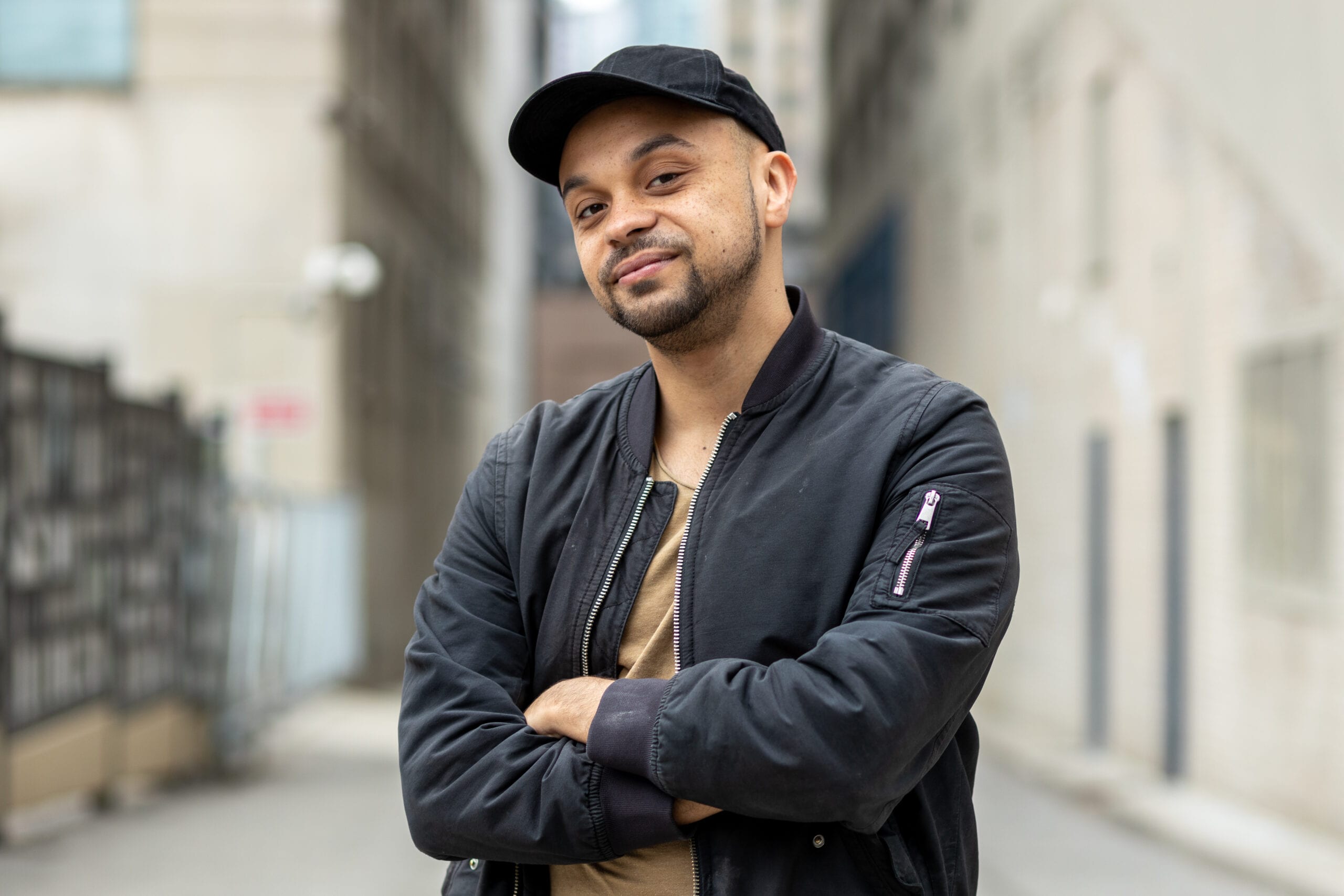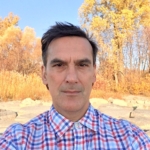Growing up in the 1990s and early 2000s in the small, hardscrabble city of Belleville in eastern Ontario, Matt Ashcroft felt incredibly isolated. From a young age, he knew he was gay. He also knew that his father, who often called him names and shamed him, would never embrace a gay son.
“With a Jamaican family, it just wasn’t culturally acceptable,” Ashcroft says. “I could not and did not feel safe coming out.”
Around the age of 23, desperate and alone, Ashcroft turned to religion in the hopes of winning his father’s acceptance. He came out as gay to a pastor, who proceeded to come out as gay to Ashcroft. It was this pastor, with his own struggles with homosexuality, who invited Ashcroft to join a secret Facebook group of religiously minded individuals battling what they called “unwanted same-sex attractions,” or “SSAs.”
Ashcroft thought he had found his community. Instead, he was embarking on a nightmarish journey of self-denial. The group he had joined promoted conversion therapy. Rather than acceptance and support, Ashcroft was confronted by a cult-like group based in shame and intimidation. “Anybody can find [similar groups] online,” Ashcroft says. “It’s actually quite scary.”
A recent Canadian study shows that Ashcroft’s experience is much more common than previously thought. The Community-Based Research Centre’s Sex Now Survey, which interviewed more than 7,200 men, found that as many as one in five gay, bisexual, trans, Two-Spirit and queer men have experienced some form of pressure to change their sexual orientation, gender identity or gender expression. Of that group, nearly 40 percent have experienced more organized and sustained forms of conversion therapy—that’s an estimated 47,000 men in Canada, more than double previous estimates.
The pressure to change comes in a wide range of practices that are collectively known as sexual orientation, gender identity or expression change efforts, or SOGIECE (pronounced so-jeese). “Sometimes it’s just a conversation where the person says to a friend or a pastor or a parent, ‘I think I might be trans,’ or ‘I think I might be bisexual.’ And that person responds in a way that isn’t anything other than saying, ‘Great. I love you and I support you,”’ says Travis Salway, a researcher and assistant professor at Simon Fraser University. “And what we know from all kinds of data and anecdotes is that when youth, in particular, make that disclosure they’ll get an ambivalent or negative response..
“Beyond a series of structured conversations, practices can get ugly,” Salway continues. “We do know examples of people who’ve been exposed to psycho ‘therapeutic’ drama, where people are asked to dig deep to figure out origins of their sexual orientation or gender identity, and to reenact it or re-experience it through a form of exposure or aversion therapy.” That’s what happened to Ashcroft.
Now 30, Ashcroft has started to share his story with the researchers behind another SOGIECE report called Ending Conversion Therapy in Canada, recently published by Vancouver’s Centre for Gender and Sexual Health Equity (CGSHE), in partnership with Simon Fraser University and other community and health organizations. In media interviews with the CBC, CTV, Xtra and elsewhere, Ashcroft paints a frightening picture of abuse in the guise of support.
In the Facebook group that Aschroft joined, members discussed seemingly helpful programs run by organizations like Exodus International—the infamous “ex-gay” ministry that shuttered in 2013 and whose founder apologized for the harm done by his group—and Brothers Road, a Virginia-based “peer-support group” with operations across the U.S. and internationally. The discussions also addressed decreasing same-sex attractions and stopping being gay.
“They had this fake and false persona, that everything was okay,” Ashcroft says. “People would say, ‘I figured out how to have healthy connections with guys. My life is so much better.’”
Hoping he could achieve the same, in 2014 Ashcroft signed up for Journey into Manhood, an “experiential weekend” located in New Hope, Pennsylvania run by Brothers Road.
“The camp was two days,” Ashcroft says. “We didn’t have any cellphones. We didn’t have any watches. We had to rely on the sun.” After signing a non-disclosure agreement upon his arrival, Ashcroft says he was ushered into a cabin where all the windows had been blacked out with garbage bags. Inside was a group of men of varying ages seated in a circle around a candle. There was no discussion of what was to come, no discussion of the pedagogy behind the programming. “I went into that entire weekend blind,” Ashcroft says.
“These camps are structured to keep you in shame and guilt,” Ashcroft says. “They’re replicating power dynamics that make sure you are kept under control.”
Ashcroft was confronted by a camp leader holding a stick, looking at each of the participants and demanding: “Why are you here?” Ashcroft recalled confessions, tears and activities that bordered on the bizarre. What followed was “a lot to process,” Ashcroft says. At one point, he was given a bat and encouraged to beat a punching bag with it—the bag was supposed to be a stand-in for his father. One of the scarier incidents involved another participant who, when younger, had been sexually assaulted by an older male relative. The camp leaders expressed their opinion that the participant was gay as a result of the rape. “So they essentially reenacted his sex abuse story,” Ashcroft says. “He was crying and screaming ‘Stop,’ repeatedly.” Ashcroft didn’t know how to respond. “I was traumatized,” he says.
“These camps are structured to keep you in shame and guilt,” Ashcroft says. “They’re replicating power dynamics that make sure you are kept under control.”
But Ashcroft wanted to change, he wanted to please his father—he trusted the camp leaders. “I didn’t really have a lot of people that I could trust,” Ashcroft says. “When they said, ‘Trust the process,’ they linked it to family and brotherhood. I so wanted to have that sense of family.” (Brothers Road did not respond to Xtra’s request for comment.)
His memory of the camp is “a blur,” Ashcroft admits. “I would say it was trauma-based, where you experience a lot happening at one time. You don’t remember everything,” he says.
“There are thousands of conversion therapy survivors, most of whom are not in a place where they can speak up,” says Salway, who was a principal researcher on both the Sex Now Survey and the Ending Conversion Therapy in Canada report. “The common denominator is that both the circumstances that bring someone to conversion therapy and the experience itself of conversion therapy very often leaves people with a feeling of shame.
“A third of conversion therapy survivors have attempted suicide. That’s really striking. I mean, suicide attempt rates are quite high in LGBTQ2 communities, but a third is an order of magnitude greater.”
“It’s basically taking those messages that as queer and trans people, we’ve probably received our entire lives and it’s really hammering them in hard,” Salway says. “The effect is some form of cognitive and emotional adaptation. The most severe form would be to start internalizing messages of self-hate and that’s often where suicide comes from. That’s why we see that a third of conversion therapy survivors have attempted suicide. That’s really striking. I mean, suicide attempt rates are quite high in LGBTQ2 communities, but a third is an order of magnitude greater.”
Ashcroft’s story follows a similar trajectory. His shame and confusion continued long after he left the camp. Remaining in contact with organizers and participants through the Facebook group, Ashcroft tried to make sense of what he had gone through. “Because I started to ask questions, I got bullied hardcore. I got called a lot of names,” Ashcroft says. “I felt ganged up on. I felt like I wasn’t in control of my own thoughts. I felt abused. It was a toxic relationship where I didn’t have a voice and they had all the voices in the world.”
Ashcroft felt more alone than ever. He had suicidal thoughts. “My mind was just stuffed down. It was awful.” But after 18 months, he found the strength to leave the group. “I just got to the point where I became jaded and angry. I wasn’t able to do anything.
“I just got frustrated and left,” he says. “I tried to find community somewhere else. And when I did, I just let it go. It was like a switch.”
In addition to advocating for a ban at the federal level, initiatives like the CGSHE report, in which Ashcroft participated, recognize that a ban is not enough. Eliminating SOGIECE will require a multi-faceted approach that includes survivor supports, community education and working to make religious, health and other institutions better value gender and sexual diversity.
“It’s still not over with,” Ashcroft says. “There are some things that I’m not the proudest about, things that I’ll have to work on in therapy.” While he no longer has a relationship with his father, Ashcroft does have a supportive group of friends around him now. He’s in a place, emotionally, where he can accept his troubled past. “Everybody in the queer community has had either issues with coming out or some initial struggle,” Ashcroft says. “So I give myself a lot of grace. I had to learn to take it easy on myself.”
A huge milestone in that healing process was reached in early March when Ashcroft travelled to Ottawa to watch the conversion therapy ban be introduced to Parliament. “I’m ecstatic,” he says. “After all those years when no one wanted to hear my voice, to have my story heard, my worth recognized. It was the coolest experience.”
On Mar. 9, Justice Minister David Lametti introduced a bill that criminalizes the following: Subjecting minors to conversion therapy or sending a minor abroad to undergo conversion therapy, practising conversion therapy on adults against their will and advertising or profiting from conversion therapy. The bill doesn’t ban the practice outright.
“This bill has the core components of what we need to curb conversion therapy in a meaningful way in Canada,” Salway says. But the cross-border aspect of Ashcroft’s story still presents challenges. “There are going to be cases where we need to look at other mechanisms,” Salway admits. “The bill does include a clause that makes it a crime to send minors to conversion therapy in the U.S., for example. And that’s important.”
“In Canada, we’re focusing on protecting all people,” Ashcroft says. “When camps that I went to will not be able to do this to any Canadian again, that’s my goal.”


 Why you can trust Xtra
Why you can trust Xtra


